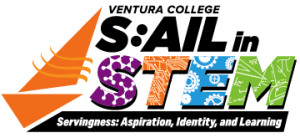Project S:AIL
STEM Adjunct / Early Career to Tenure Program

In Fall 2024, I was invited to join the STEM Adjunct / Early Career to Tenure Program under Project S:AIL (Servingness: Aspiration, Identity, and Learning in STEM).
The series brought together early-career STEM faculty across the district to explore how equity, identity, and servingness intersect with classroom practice and tenure preparation. Participating in this cohort created a rare professional space where teaching, reflection, and cultural awareness were treated as mutually reinforcing forms of growth.
Program Overview
Each week’s session paired pedagogical theory with reflective dialogue. Rather than receiving information passively, we analyzed our own syllabi, assessments, and classroom norms through an equity lens—identifying how tone, structure, and expectations shape belonging in STEM spaces. Facilitators guided us through readings, case studies, and collaborative workshops, emphasizing that the work of teaching in an HSI context involves both professional and personal transformation.
Session Timeline & Key Topics
November 1, 2024
Session 1 – The Students
Coaches: Dr. Raeanne Napoleon
Session 1 – The Students
Coaches: Dr. Raeanne Napoleon
The opening session introduced cultural introductions and affective coaching practices in STEM classrooms.
Participants reflected on their own cultural identities, teaching personas, and early career journeys, guided by discussion on discomfort as a catalyst for learning and “stepping up/stepping back” as facilitation tools for equity.
The session emphasized that vulnerability and cultural self-awareness are foundational to servingness in instruction.
November 8, 2024
Session 2 – The Pedagogy and Practice (I)
Coach: Dr. Raeanne Napoleon
Session 2 – The Pedagogy and Practice (I)
Coach: Dr. Raeanne Napoleon
The asynchronous module deepened reflection on race-conscious pedagogy through readings and media:
- Dr. Christopher Emdin’s conversation on teaching identity and classroom authenticity
- Dr. Roni Ellington’s AAAS talk on culturally responsive teaching (CRT) in STEM
- Readings from Dr. Gina Ann Garcia’s Transforming HSIs for Equity and Justice
Faculty completed journaling and Padlet reflections examining how identity and affect shape instruction, moving toward the question: “Who am I as a teacher in this space?”
November 15, 2024
Session 3 – The Pedagogy and Practice (II)
Coaches: Dr. Raeanne Napoleon & Adrienne Arguijo
Session 3 – The Pedagogy and Practice (II)
Coaches: Dr. Raeanne Napoleon & Adrienne Arguijo
This session connected data inquiry with equity-minded storytelling.
- Counterstories: Transforming the Narrative Through Data Inquiry introduced ways to interpret institutional data through lived experiences rather than deficit models.
- Participants explored liberatory outcomes—identity development, critical consciousness, social agency—based on Garcia’s frameworks.
- The HSI Summit – Transforming VC for Equity & Justice presentation tied these ideas to Ventura College’s master plan goals for equity, success, and servingness.
Faculty practiced reframing data as community stories to identify institutional rather than student-based causes of inequity.
November 22, 2024
Session 4 – The Pedagogy and Practice (III) – Roundtable Event
Coaches: Dr. Raeanne Napoleon & Dr. Gema Sanchez
Session 4 – The Pedagogy and Practice (III) – Roundtable Event
Coaches: Dr. Raeanne Napoleon & Dr. Gema Sanchez
Held as a Brunch Roundtable, this meeting combined pedagogical application and career preparation.
- STEM Academic Counseling discussion on integrating student support within courses
- Syllabus as a Tool for Racial Equity activity using the USC Race & Equity Center Review Guide
- Roundtable with faculty and deans on CVs, cover letters, teaching demonstrations, and tenure navigation
Emphasis was placed on aligning professional growth with equity-minded teaching and community building.
December 6, 2024
Session 4 – | The Self – Sustaining Equity Practice
Coach: Dr. Raeanne Napoleon
Session 4 – | The Self – Sustaining Equity Practice
Coach: Dr. Raeanne Napoleon
The closing workshop revisited the syllabus redesign process, encouraging participants to finalize equity-centered syllabi grounded in inclusive tone and transparent expectations.
Discussion on sustaining change centered on the recognition that discomfort, reflection, and collaboration are ongoing elements of growth.
The program concluded with certificate presentations and collective evaluation of how participants’ practices evolved across the series.
Key Learning Themes
- Equity as Practice — Recognizing how institutional habits and language reproduce inequity helped me become more intentional about course design and communication.
- Counterstories & Data — The data-narrative framework shifted how I interpret student outcomes—from numbers to fix into stories that reveal systemic patterns.
- Syllabus as a Tool for Equity — Using the USC Race & Equity Center review guide highlighted how layout and tone communicate inclusion as much as policy does.
Personal Reflection
The program reminded me that professional growth is inseparable from cultural awareness. As I examined how students experience my courses, I realized that equity is not only a set of strategies but a stance—one that requires constant self-reflection and the courage to adapt. It prompted me to see teaching as an ongoing practice of alignment between rigor and empathy.